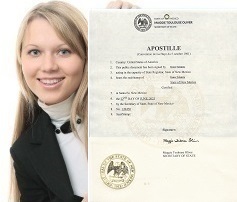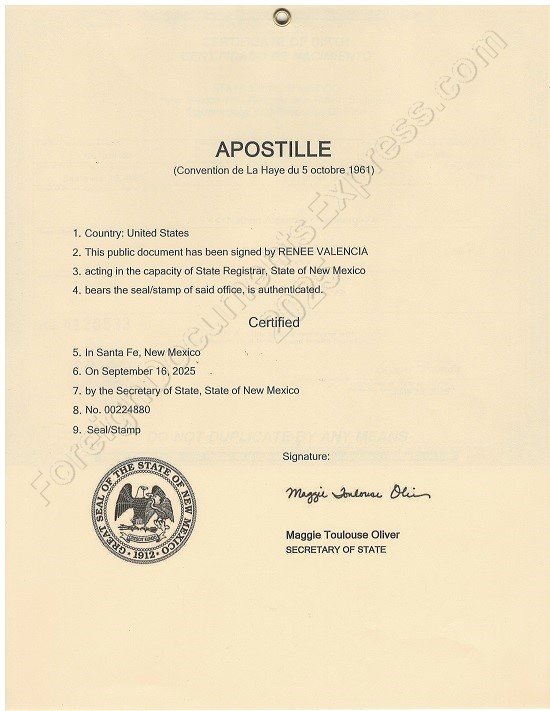New Mexico Hague apostille
Do you need Hague apostilles for your New Mexico documents? We provide Apostille and Embassy legalization services in the State of New Mexico and nationwide, for documents intended for international use.
If you are traveling overseas, or sending a New Mexico document for use in a foreign country, you may be required to have the document apostilled or legalized. Hague apostilles have been adopted internationally as a uniform way of verifying documents sent between countries.

In the State of New Mexico, as in all U.S. states, an apostille is a separate page attached to the document by an eyelet. It is signed by the Secretary of State (facsimile signature) and has the Seal of the State of New Mexico. New Mexico apostilles are issued in the English language.
![]() New Mexico apostille: $175
New Mexico apostille: $175
Processing time: app. 2 weeks + mail
![]() Please complete the Order Form and mail it with your original document(s) to
Please complete the Order Form and mail it with your original document(s) to
If you are sending your document(s) from a foreign country, please use FedEx, DHL, UPS or TNT, and email the tracking number so that we can watch for your package.
 No hidden fees.
No hidden fees.
Our guarantee: If we are unable to get your documents apostilled or legalized, we will issue a 100% refund, we do not keep any service fees.
Free document evaluation
Want to double check before shipping your document? Email a copy for a free evaluation.
New Mexico apostille guidelines and tips
An apostille is attached to a notarized original document or a certified recorded instrument. For documents that are notarized, the apostille verifies that the person who notarized the document was appointed to a notary public commission in New Mexico at the time of the notarization. For certified recorded instruments issued by government agencies, the apostille verifies that the person who certified the document was an appointed or elected official in New Mexico at the time of the certification. Examples of public documents include birth certificates, death certificates, marriage licenses, divorce decrees, and school transcripts.
The following documents qualify for New Mexico apostilles:
 notarized by notaries public qualified in the State of New Mexico
notarized by notaries public qualified in the State of New Mexico issued and certified New Mexico County Clerks
issued and certified New Mexico County Clerks signed by New Mexico State Registrar of Vital Records
signed by New Mexico State Registrar of Vital Records issued County Clerk Recorders
issued County Clerk Recorders documents signed by New Mexico Secretary of State
documents signed by New Mexico Secretary of StateBirth and death certificates should be issued by the State registrar of vital records.
Notaries Public may NOT make a photocopy of a birth certificate or a death certificate. Birth and death certificates are official state records. Certified copies may be obtained only from the State Registrar of Vital Records at Vital Records & Health Statistics in Santa Fe, New Mexico by calling 505-827-0121 or by visiting their website nmhealth.org.
 Marriage certificates should be issued by the Office of the County Clerk. The copies must be certified by the County Clerk.
Marriage certificates should be issued by the Office of the County Clerk. The copies must be certified by the County Clerk.
Notaries Public may NOT make a photocopy of a marriage certificate. Marriage certificates are official county records.
 Divorce judgments should be issued by the District Court in the county where the divorce was filed. Plain copies are not eligible. The copies must be certified.
Divorce judgments should be issued by the District Court in the county where the divorce was filed. Plain copies are not eligible. The copies must be certified.
Notaries Public may NOT make a photocopy of a divorce judgment. Divorce records are official county records.
 School transcripts and diplomas - must be issued by the school registrar and notarized. Read more about apostille requirements for school transcripts in the State of New Mexico...
School transcripts and diplomas - must be issued by the school registrar and notarized. Read more about apostille requirements for school transcripts in the State of New Mexico...
 Notarized document (e.g. powers of attorney, affidavits, etc.) must have the original signature of the signer and the notarial statement (acknowledgment or jurat)
Notarized document (e.g. powers of attorney, affidavits, etc.) must have the original signature of the signer and the notarial statement (acknowledgment or jurat)
Acknowledgment:
(for personal powers of attorney, affidavits, statements, letters, consents, copies of diplomas and transcripts signed by school officials, etc.)
Jurat:
(for personal powers of attorney, affidavits, statements, letters, consents, copies of diplomas and transcripts signed by school officials, etc.)
 Certificates of Good Standing issued by NM Secretary of State are acceptable for apostilles as PDF files. Just forward the PDF file to us.
Certificates of Good Standing issued by NM Secretary of State are acceptable for apostilles as PDF files. Just forward the PDF file to us.
We obtain apostilles for documents originating from all 23 New Mexico counties: Bernalillo | Catron | Chaves | Cibola | Colfax | Curry | DeBaca | Dona Ana | Eddy | Grant | Guadalupe | Harding | Hidalgo | Lea | Lincoln | Los Alamos | Luna | McKinley | Mora | Otero | Quay | Rio Arriba | Roosevelt | San Juan | San Miguel | Sandoval | Santa Fe | Sierra | Socorro | Taos | Torrance | Union | Valencia
What does a "proper notarization" mean in the State of New Mexico?
![]() All notarized documents must contalin the notarial statement, either the acknowledgment or jurat.
All notarized documents must contalin the notarial statement, either the acknowledgment or jurat.
Acknowledgment:
(for personal powers of attorney, affidavits, statements, letters, consents, copies of diplomas and transcripts signed by school officials, etc.)
Jurat:
(for personal powers of attorney, affidavits, statements, letters, consents, copies of diplomas and transcripts signed by school officials, etc.)
Corporate Acknowledgment:
(for corporate powers of attorney, certificates of incumbency, affidavits, etc.)
Can New Mexico notaries attest to copies of the documents?
![]() Yes, except for vital records (birth, marriage, death certificates), documents issued by the courts (divorce judgments) or any other public records office.
Yes, except for vital records (birth, marriage, death certificates), documents issued by the courts (divorce judgments) or any other public records office.
Sample wording for certifying photocopies:
Copy Certification:
(for certifying copies of passports, IDs, driver licenses, diplomas and other personal documents)
IMPORTANT! Copies of vital records (birth, death, marriage certificates, divorce judgments) cannot be certified by a notary public.
Can a remotely notarized document be apostilled in New Mexico?
![]() No. For notarized documents, the State of New Mexico requires the original signatures of the signer and the notary.
No. For notarized documents, the State of New Mexico requires the original signatures of the signer and the notary.
Does the State of New Mexico issue electronic apostilles?
![]() No. The State of New Mexico issues paper apostilles only.
No. The State of New Mexico issues paper apostilles only.
Are New Mexico apostilles issued for documents in foreign languages?
![]()
Yes. Your document may be in a foreign language. However (important!), the notarial statement must be in English.
Can a New Mexico apostille be verified?
![]() Yes. Here is the link to the website of NM Secretary of State where you can verify a New Mexico apostille: Apostille Verification | An Official New Mexico Government Website
Yes. Here is the link to the website of NM Secretary of State where you can verify a New Mexico apostille: Apostille Verification | An Official New Mexico Government Website
Can a New Mexico apostille be rejected by a foreign country because it is a separate page (not a stamp)?
![]() No. According to the Hague Convention Apostille brochure called "The ABCs of Apostilles from HCCH",
No. According to the Hague Convention Apostille brochure called "The ABCs of Apostilles from HCCH",
"An Apostille must be placed directly on the public document or on a separate attached page (called an allonge). Apostilles may be affixed by various means, including rubber stamps, self-adhesive stickers, impressed seals, etc.
If an Apostille is placed on an allonge, the latter can be attached to the underlying document by a variety of means, including glue, grommets, staples, ribbons, wax seals, etc.
Failure to affix an Apostille in a particular manner is not a basis for refusing the Apostille."

